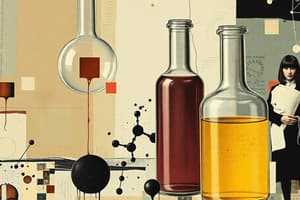Podcast
Questions and Answers
What distinguishes intensive properties from extensive properties?
What distinguishes intensive properties from extensive properties?
- Intensive properties remain the same regardless of the amount of substance. (correct)
- Intensive properties depend on the amount of matter present.
- Intensive properties can be measured physically.
- Intensive properties change with changes in temperature.
Which of the following is an example of a physical change?
Which of the following is an example of a physical change?
- Burning of wood
- Melting of ice (correct)
- Rusting of iron
- Baking a cake
What type of reactions are associated with chemical properties?
What type of reactions are associated with chemical properties?
- Reactions that do not involve energy changes
- Reactions that create new substances (correct)
- Reactions that are reversible
- Reactions that involve physical changes
Which statement about gases is true?
Which statement about gases is true?
What is the importance of phase change?
What is the importance of phase change?
Which of the following is a pure substance?
Which of the following is a pure substance?
Flammability is classified as which type of property?
Flammability is classified as which type of property?
What happens to gas particles when they gain energy?
What happens to gas particles when they gain energy?
What characterizes a compound?
What characterizes a compound?
Which of the following best defines extensive properties?
Which of the following best defines extensive properties?
Which process is an example of a physical change?
Which process is an example of a physical change?
What defines a chemical property?
What defines a chemical property?
Which statement correctly describes the behavior of gases?
Which statement correctly describes the behavior of gases?
How does rusting occur?
How does rusting occur?
What happens during a phase change?
What happens during a phase change?
What is an effect of increasing temperature on gas particles?
What is an effect of increasing temperature on gas particles?
Flashcards
Element
Element
A pure substance made of only one type of atom.
Compound
Compound
A substance formed from two or more elements chemically combined.
Physical Property
Physical Property
A characteristic of matter that can be observed or measured without changing its chemical composition.
Physical Change
Physical Change
Signup and view all the flashcards
Extensive Property
Extensive Property
Signup and view all the flashcards
Intensive Property
Intensive Property
Signup and view all the flashcards
Chemical Property
Chemical Property
Signup and view all the flashcards
Phase Change
Phase Change
Signup and view all the flashcards
What makes a substance a compound?
What makes a substance a compound?
Signup and view all the flashcards
What's the difference between physical and chemical properties?
What's the difference between physical and chemical properties?
Signup and view all the flashcards
Give an example of an extensive property.
Give an example of an extensive property.
Signup and view all the flashcards
Flammability
Flammability
Signup and view all the flashcards
Volatility
Volatility
Signup and view all the flashcards
What is rusting?
What is rusting?
Signup and view all the flashcards
What are the states of matter?
What are the states of matter?
Signup and view all the flashcards
How does plasma form?
How does plasma form?
Signup and view all the flashcards
Bose-Einstein condensate
Bose-Einstein condensate
Signup and view all the flashcards
What is a phase change?
What is a phase change?
Signup and view all the flashcards
Study Notes
Elements and Compounds
- An element is a pure substance made of only one type of atom.
- A compound is a substance made of two or more elements chemically combined.
Properties of Matter
- Properties describe characteristics of matter.
- Physical properties can be observed or measured without changing the substance's composition (e.g., color, mass, volume).
- Extensive properties depend on the amount of matter (e.g., mass, volume).
- Intensive properties do not depend on the amount of matter (e.g., density).
Physical and Chemical Changes
- Physical changes alter the physical form or appearance of matter without changing its chemical composition.
- Chemical changes involve the rearrangement of atoms to form new substances, changing the chemical composition.
- Chemical properties describe a material's ability to undergo chemical changes.
Examples of Physical Properties
- Flammability: Ability to catch fire.
- Volatility: Tendency to vaporize.
- Rusting: Chemical reaction between metal and moisture (an example of a chemical change).
States of Matter
- Solid: Definite shape and volume.
- Liquid: Definite volume, but takes the shape of its container.
- Gas: No definite shape or volume, takes the shape and volume of its container.
Phase Changes
- Melting: Solid to liquid.
- Solidification: Liquid to solid.
- Vaporization: Liquid to gas (boiling or evaporation).
- Condensation: Gas to liquid.
- Sublimation: Solid to gas (skipping the liquid phase).
Water
- Water is essential to living things; 75% Earth's surface covered by water.
Phase Diagram
- Critical point: The temperature and pressure above which a substance cannot be liquefied.
- Show different phases and conditions of temperature and pressure for a substance.
Studying That Suits You
Use AI to generate personalized quizzes and flashcards to suit your learning preferences.




